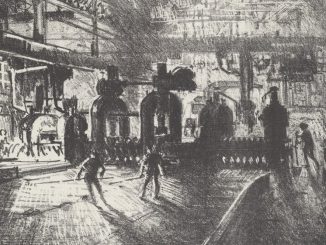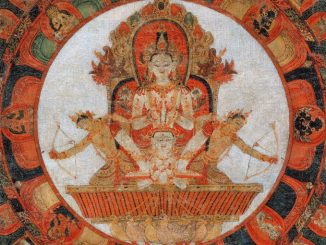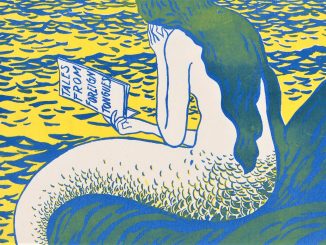
Tom Lutz has quietly been structuring one of the four corners of the Southern California literary scene. We speak with Dr. Lutz about receiving the American Book Award in 2008 and his take on current events.

Tom Lutz is a good fellow, an interesting interview, and a good read. Accomplished and world traveled, Lutz is a University of California, Riverside, distinguished chair with writing in his DNA and coursing in his bloodstream. He is responsible for quietly manifesting the infrastructure of Southern California’s literary landscape.
Having won one of America’s most distinguished awards in 2008—the American Book Award for Doing Nothing: A History of Loafers, Loungers, Slackers, and Bums in America—he launched the Los Angeles Review of Books (LARB) in 2011, currently attracting approximately 6,000,000 page views and four print issues per year. He is in the midst of a prolific writing career and the journal is off to a magnificent start in the new millennium.
The LARB also boasts one of SoCal’s most innovative and dynamic young teams of editors, correspondents, artists, and graphic designers, all headed by executive editor Boris Dralyuk and managing editor Medaya Orcher, both immigrants. The New Yorker said its West Coast counterpoint is “one of the instant jewels of the internet.” Forbes magazine added to the chorus, calling LARB “a perfect example of disruptive innovation.” Walter Mosley named it “a counterpoint and counterbalance,” and Margaret Atwood said, “The Los Angeles Review of Books is one of the bright spots, a phoenix rising from the ashes.”
Of his own work, Lutz stated,
“The older I get the more I realize that the only real pleasure is in doing the work, in the process, in the writing, in the making.”
The above rhymes with the four touchstones of this burgeoning kingdom in a city of angels at the beginning of the 21st:
- Los Angeles Review of Books (which includes LARB Radio; LARB Quarterly Journal; website; Guernica Magazine; the Publishing House workshop in conjunction with the University of Southern California and its coming publishing imprint);
- Tom Lutz’s teaching at UC Riverside (exceptional pedigree with post-undergraduate bonafides from Stanford and an East Coast upbringing out of an Allen Ginsberg poem or Jack Kerouac novel);
- his widely anthologized life via books (six, including 7th & 8th forthcoming travel journals); and
- his ongoing global travels, bringing it all together and just getting the danged deals done.
Yes, Tom Lutz is erudite but has not lost his common touch. His life’s work seems to lift the convention of literary traditions and place them under a glowing light where the best and the brightest are attracted to its shine. A sly twinkle glittering from his eye, he knows his way around a deal and the vagaries of US American publishing. His eyes brim with passion as there is no shortage of ambition; just as his prose is minimalist. I joked with Tom after a chance meeting at the recent Red Hen Press 24th Annual Benefit Luncheon (MC’d by founders Kate Gale and Mark E. Cull). Something about a fabled wolf who is at home with sheep—none of his ambition, productivity, or curiosity are dulled. He is piqued with consciousness, positivity, and a goodwill that are infectious. A higher consciousness, balance, and goodness characterize his style and works, a sharp transcendentalism that is warm, undulating, and uncommon amongst accomplished men.

Patrick A. Howell: You received the 2008 American Book Award for your book, Doing Nothing: A History of Loafers, Slackers, and Bums in America. 2008 was a really interesting time, a little bit different from where we are now—the economy was on the brink of collapse and Barack Obama had just become president. How did that book award change your life and literary life, if at all?
Tom Lutz: The American Book Award is the greatest honor I’ve experienced—Ishmael Reed and the other people who founded the Before Columbus Foundation originally started the awards in response to the lack of diversity in the National Book Awards, as a way to promote multicultural literatures. Because I was very interested, in that book, in talking about the way race and ethnicity play into ideas of work and work ethics in American culture, I am especially pleased that it was recognized by the group of extraordinary writers in that organization.
I’m not sure it changed my life much … it certainly made me feel better about everything for a while, and it does so again when I happen to think about it. But recognition doesn’t really mean much, does it? I was recently named Distinguished Professor at UC Riverside, and it doesn’t make me feel more distinguished, really. Publishing books or articles feels good momentarily, but the older I get the more I realize that the only real pleasure is in doing the work, in the process, in the writing, in the making. I love that—the recognition is very minor, comparatively.
The timing for the book wasn’t great. We love slacker characters—like the Big Lebowski—in times of plenty; in recessions or depressions, when work is hard to come by, they don’t seem so funny.
PAH: You have carved out a little niche for yourself in life—writing, publishing, and standing out for your nonfiction, including the aforenoted Doing Nothing, but also with work appearing in the New York Times, Chicago Tribune, and LA Times. Two of your books—Crying: The Natural and Cultural History of Tears and American Nervousness, 1903: An Anecdotal History—were 1999 and 1991 New York Times Notable Books. What’s the secret to writing great creative nonfiction, Tom?
TL: I wish I knew! I think those three books—Crying, Doing Nothing, and 1903—are more research nonfiction, a slightly different category. The travel books, and some of my shorter pieces, are clearly creative nonfiction, in that they are meant to be enjoyed as pieces of writing, meant to give narrative pleasure, whereas research nonfiction should have some news to impart. I mean, we hope the research stuff is pleasurable, and the creative work has something valuable to say, but they are different genres and have different requirements. For instance, I know more about crying and more about the year 1903 than just about anyone alive, but I cannot say that for any of the 60 or 70 countries I visit in the travel narratives.

PAH: You were in Ethiopia recently at a really interesting time in that country’s history (potentially Africa’s and the world’s) with the election of President Dr. Abiy Ahmed. Sweeping reforms are taking place in the country and Dr. Abiy is infinitely more popular than the previous EPRDF party. As someone who has traveled the world—well chronicled in And the Monkey Learned Nothing: Dispatches from a Life in Transit (2016)—what were some of your observations? You did not get the opportunity to include those observations in your 2016 opus.
TL: No, a few moments from the Ethiopian trip will be in the third volume, which I’m trying to finish this coming year. When Dr. Ahmed was elected, Ethiopia experienced a moment a bit like the election of Barack Obama—there was a sense, even more widespread than it was in America, of hope and change, of a new world being born. I was there for the Ethiopian New Year, which was on September 11, and President Ahmed had encouraged the diaspora to come home for the celebration. A friend of mine from Los Angeles, Elias Wondimu, founder of Tsehai Press and Harriet Tubman Press, went home for the first time in 24 years, having been exiled by the previous regime. As I stood with him in his cousin’s house, we watched President Ahmed meet the dictator of Eritrea on the Eritrean border, and they hugged each other; soldiers from the two armies, who had been fighting each other for twenty-plus years, laid down their weapons and hugged each other, and then citizens from both countries ran into the former battlefield and embraced. Elias and his family were in tears—we never, never thought we would see this day, his cousin said to me, and it happened because Ahmed unilaterally declared the war over, acceded to the Eritrean desires for where the border should run, and just said, enough. There have been, for decades, pronounced ethnic conflicts, and Ahmed, who is half Oromo and half Amharic, represents in his person, like Obama, a bridge across the divide. It was a thrilling time to be there, and everyone, from the monks in the hills to the children in the street to the academics and taxi drivers, felt the momentousness of the change.
PAH: Tom, you seem to have an interesting take on the Millennials, again with your 2008 book Doing Nothing: A History of Loafers, Slackers, and Bums in America being inspired in great part about your son, Cody, 18 at the time. Or, as Oscar Wilde noted, “To do nothing is the most difficult thing in the world.” How are Millennials different from others—as the Baby Boomers or Greatest Generation?
TL: One thing studying history has taught me is that these descriptors—this generation is like x, that generation is like y—are not very precise. In terms of sexual mores, some people in their twenties today are more like people who were in their twenties in the 1950s than they are like our generalizations about Millennials. In 1903, you can find people saying things that sound like it’s 1875, and people who sound like it’s 1925. And one person’s greatest generation—honest, hardworking, patriotic—is another person’s horror—patriarchal, racist, close-minded twits. Boomers Bernie Sanders, Donald Trump, Samuel Jackson, Bill and Hillary Clinton, Oprah Winfrey, Rush Limbaugh, Mick Jagger, Arianna Huffington, Dolly Parton, they are all born within 10 years of each other. How can you think of them as a single generation? And the same is true for Millennials: they are megachurch conservatives, they are sexually fluid urbanites, they are immigrant strivers, they are lazy, overprivileged suburbanites. Some have great work ethics, some don’t. People driven by a work ethic have been around since the Industrial Revolution, and people who are or want to be slackers have been around exactly as long—the two need each other—and that is true in every generation.
PAH: No offense here, Tom, but you are the definition of an erudite reformed yuppie; at least according to the unofficial Jack Kerouac-Allan Ginsberg-Charles Bukowski diagnostic manual (JU-NM-PR Diagnostic Manual). You were born in New Jersey, schooled in Massachusetts, did your post-undergraduate at Stanford, and, this is where the reform comes in, traveled the world with a very specific set of impressions and the highest form of education. As a so-called “black” man speaking with a so-called “white” man (we are all people), where do you see the future of race relations for our America and your son Cody in the coming millennium, particularly within the hyper-partisan ethos that currently characterizes the culture and politics?
TL: Whether we use the JU-NM-PR Diagnostic Manual or some other measure, or the Jack Kerouac-Allan Ginsberg-Charles Bukowski Diagnostic Manual, I am definitely a white guy, not just so-called, but evidently. But, still, I tell my own story a little differently. If you just look at my CV and don’t check the dates, it can look like a straight line. But I started my adult life in the working class, not as a yuppie (I despised yuppies), but as a marginally employed construction worker, cook, and bar musician (much of the time playing in Black and Latino bands), and I had my first kid when I was 21, and then a second and third all before I had a college degree, much less anything like a professional job. And the first professional job I got was as a teaching assistant, and then as a low-paid assistant professor in the Midwest—this was a step up the prestige ladder, but it wasn’t otherwise very upwardly mobile. I made a better hourly rate as a carpenter than I did as a teacher for the first fifteen years. And I spent my early time in academia continuing to play in bar bands on the weekends and take some remodeling jobs to make ends meet for the aforementioned children. On paper it might look yuppie, but the reality was much funkier. Now, I have a very good job at UCR, and nice house and car, and have all the trappings of a yuppie, even though no longer young and probably not upwardly mobile anymore. I’m pretty much at the top of the academic ladder. That makes me a yuppie, I guess …
The future of race relations is a more interesting question. I see the future at my day job at UCR, where the undergraduates are 17% white, the rest Cambodian, Vietnamese, Chinese, Armenian, Filipino, different kinds of Latinx and Black, and many others, mixed and unmixed. As a historian, I can trace a centuries-long tradition of American inclusion and mutuality, and, side-by-side with it, a centuries-long tradition of exclusion and oppression. My Mexican American son-in-law, when someone suggests that the arc of history bends toward justice, will often say, “That has not been my experience.” A hundred years ago, 70% of Americans would have agreed with Trump’s racial ideas, and 20% would have disapproved. And so, while it is depressing that 40% of the American people now say they approve of Trump, 55% do not, and 5% are out to lunch. It’s not good, but it represents progress. It shows the arc of history bending toward justice. When we as a nation, in a very few years, become majority minority, the arc will bend a bit farther.
But then there is Ben Carson, and the conservative Cubans, and even the workers outside the Home Depot from Honduras and Guatemala who approve of Trump and want the wall, and the millions of white racists will continue to reproduce themselves—the Promised Land is a long way off, and we each and every one of us need to commit and recommit to justice in order to even approximate it. I’ve written a bit about the 1910s and 1920s, when what we came to call multiculturalism was being invented, the Harlem Renaissance was happening, the NAACP founded—and that time of great progress was also the rise of the modern Klan, race riots in Atlanta and Tulsa, the epidemic of lynching. Progress often looks like two steps forward and one back, and often causes a virulent response. Trump is a big, virulent step back, but that doesn’t mean we aren’t also taking two steps forward.

PATRICK A. HOWELL is an award-winning banker, business leader, entrepreneur, and writer. Howell is a frequent contributing writer to the Huffington Post, Tishman Review‘s Craft Talk series, Into the Void, and is a Good Men Project Blue Box Columnist. His first work was published with the UC Berkeley African American Literary Review and Quarterly Black Book Review. At Cal Berkeley, he co-founded Diatribe—a People of Color News Collective. Howell’s integrated book of poetry-design, Yes, We Be, was published by Jacar Press in February of 2018. He graduated from the Leopardi Writer’s Conference in Recanati Italy to complete work on Quarter ’til Judgement Day, a coming of age experimental fiction work.
Twitter: @patrickanthony
Featured image: Late Roman Republic, “Wall painting fragment from the peristyle of the Villa of P. Fannius Synistor at Boscoreale,” fresco, ca. 50-40 BCE, Rogers Fund, 1903, The Metropolitan Museum of Art.


